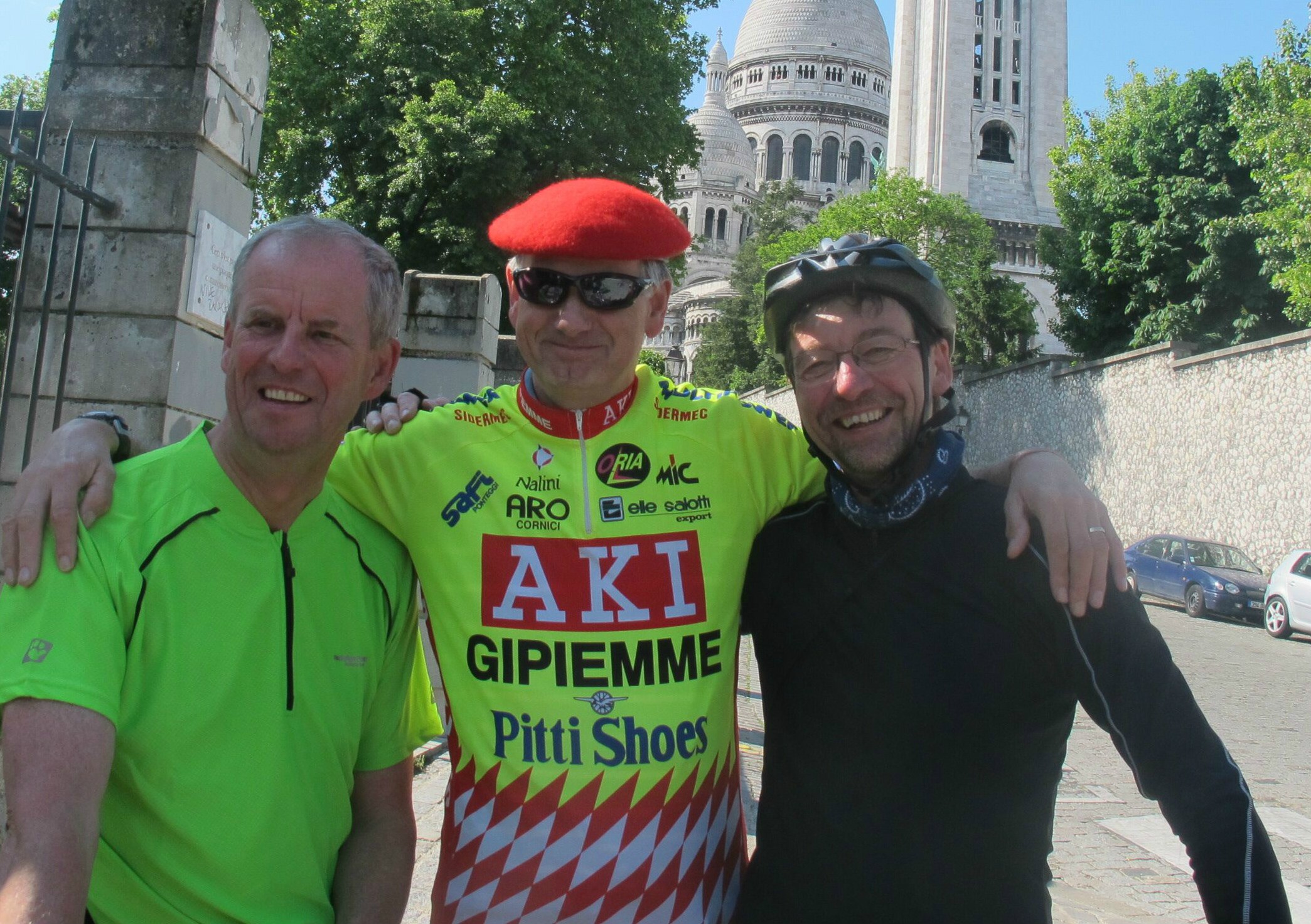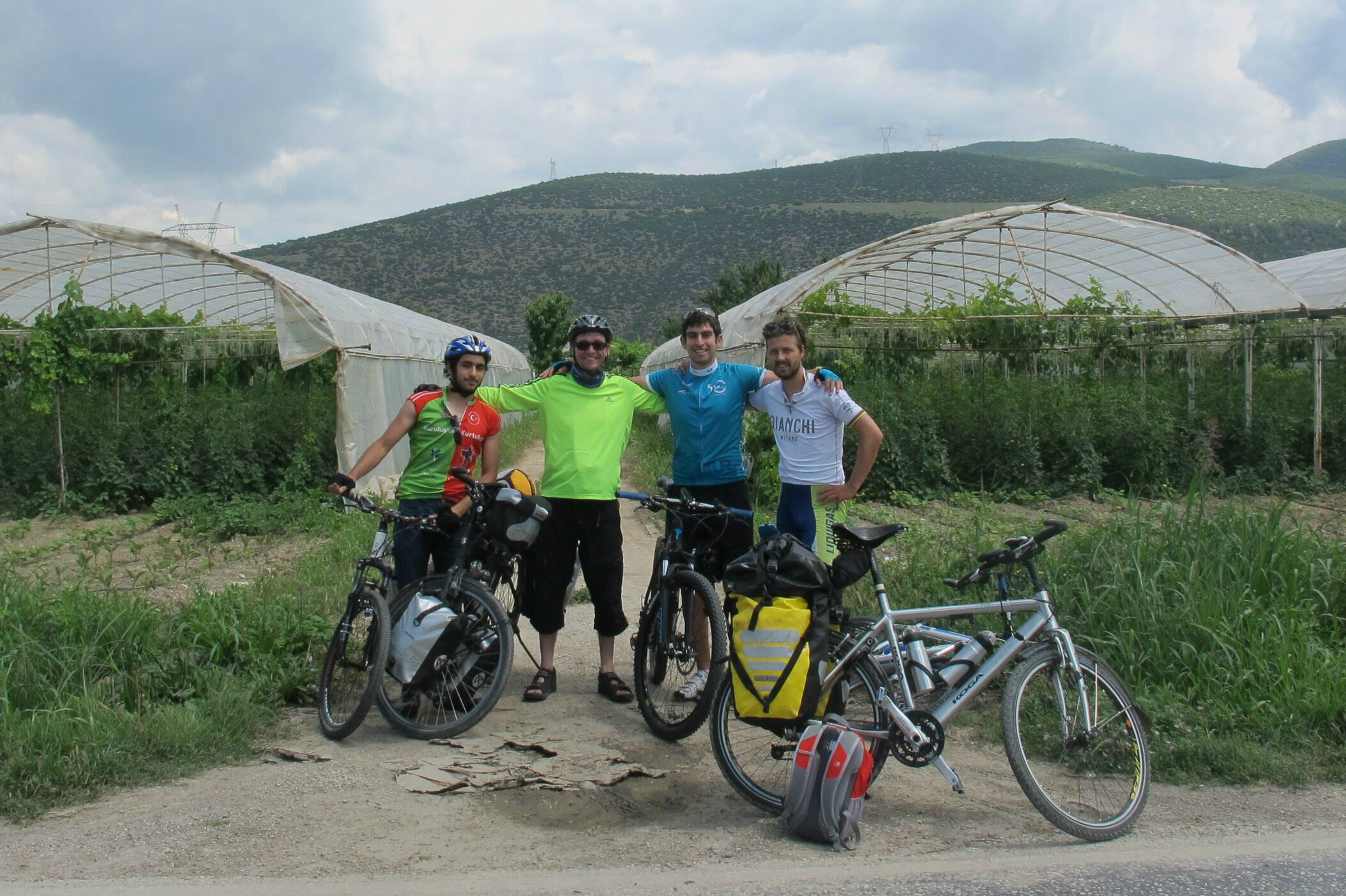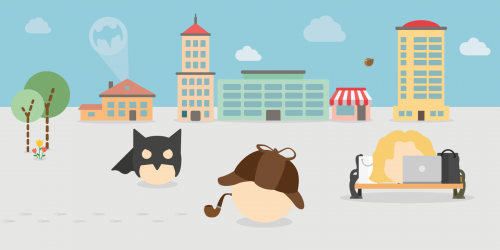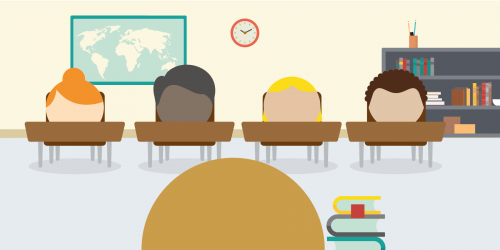My World Charity Cycle Ride – funded by supply teaching
14 minutes to read

‘I don’t think that going to school for eleven years, going to University and immediately back to school again to teach makes for a well-rounded teacher.’ That was the line that clinched my first proper job, forty years ago.
Taking a year off from teaching college to go travelling was almost unheard of then, but the Head of Art at the school – a genuinely heroic veteran of the D-Day landings – appreciated the value of wide experience and employed me after I talked enthusiastically about how my recent travels had educated and changed me.
My ‘gap year’ (before the term had been coined!) in the early 1970s was a rambling hitch-hiking trip taking me through Europe, Morocco, Canada and USA doing various odd-jobs, including dish-washing in the US Army and working for a large company in Germany. It enabled me to accumulate a wide experience of people, places and situations. I had increased my people-skills, resilience and flexibility of mind – all attributes required in a successful teacher.
After a varied teaching career working with all ages and abilities, including sixteen years of deputy headship of a large special school and then briefly as a head, I had started to think about the next stage of life. A cliché perhaps, but like many others imagining the years of bliss post-retirement, I discovered that I was still interested in experiencing countries – not as a neatly packaged ‘tourist’ but as a ‘traveller’ again. Sitting at home watching TV or by the sea on a hotel balcony vicariously living the adventures written by other authors was not my only aspiration.
A plan comes together
Some years before retiring, I had discussed with my wife a vague plan to cycle around the world.
I’d always been a keen cyclist and had built cycling activities into both my personal and school life. I’d enjoyed some long rides, including Land’s End to John O’Groats and The Camino through France and Northern Spain. Youngsters had gained much from long, challenging charity bike rides I had planned – team and resilience-building routes, some of more than 250 miles, camping along the way. I’d written an article in ‘Cycle’ magazine highlighting the benefits of cycling for children with SEN. It was during these experiences that the idea of a round-the-world trip began to form.
The plan took shape. It would be completed over a number of years in rides lasting no more than six weeks. I would build up funds by signing with supply teaching agencies and working as a moderator for GCSE Art. These rides would not be purely hedonistic holidays as I would be raising funds for two charities important to me. One supporting families of children born with severe heart conditions, as my nephew had been, and the other supporting people who had experienced torture.
Since 2012, I have cycled through thirteen countries and have raised over £2,000. I am now more than a third of the way through my seventeen thousand mile trip. This is the story so far…
Stage one: home to Paris
Arrival in Paris with Tom and Phil
The first section of the ride was relatively straightforward. Accompanied by two friends, I rode the 400 miles from my home to Paris. We used quiet routes in the UK and then Route Verte, an easy to follow route from Dieppe to Paris. My successful taster trip ended with wives, families and friends joining us to celebrate our achievement.
The prospect of travelling alone can create some anxieties but there are advantages too; an increased flexibility and openness to new experiences, no compromises. I’d very much enjoyed the company of friends on the first trip but resolved that all subsequent sections of my journey would begin alone. I’ve since met with numerous other cyclists who also prefer the advantages of solo travel.
Stage two: Paris to Istanbul
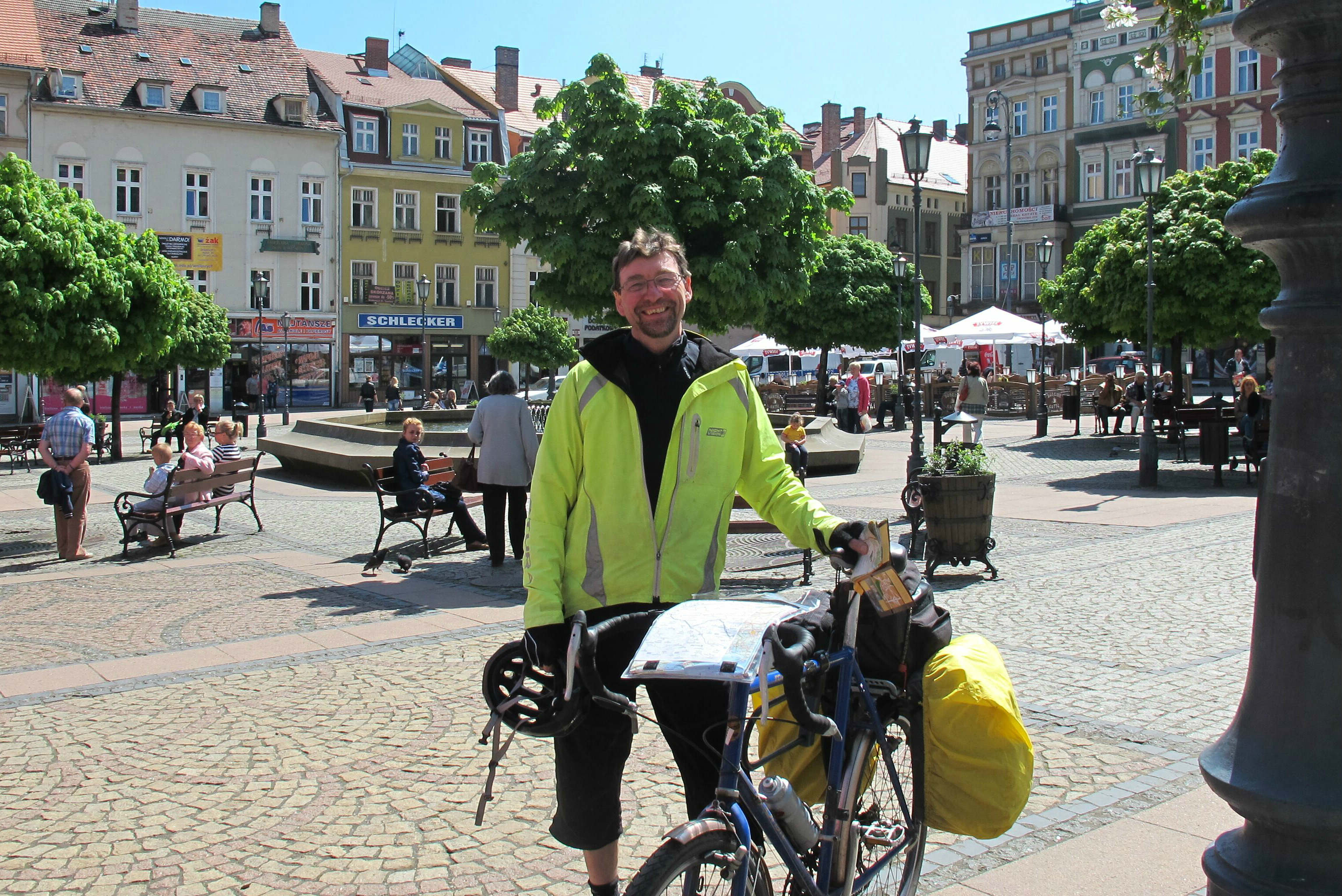
Town square in the historic city of Walbrzch, Poland
Paris to Istanbul was more challenging – two and a half thousand miles, over five weeks. Through seven countries, I slept in cheap hotels, only arriving at destinations at dusk. I cycled seventy miles a day, allowing for ‘rest-days’ at interesting cities.
Most days it rained, incessantly so on the final days. I arrived in Istanbul at the pre-booked hotel after midnight, soaked, mud-spattered, a foul-smelling vagrant. The young receptionists were very welcoming – one wheeled my bike to a storage room, while another smiled, asking if I’d like a beer and a pizza. Ah, a perfect ending.
Two days later, shaved and wearing newly purchased clothes, I waited in Ataturk International Airport holding a big card saying ‘Mrs Barden’.
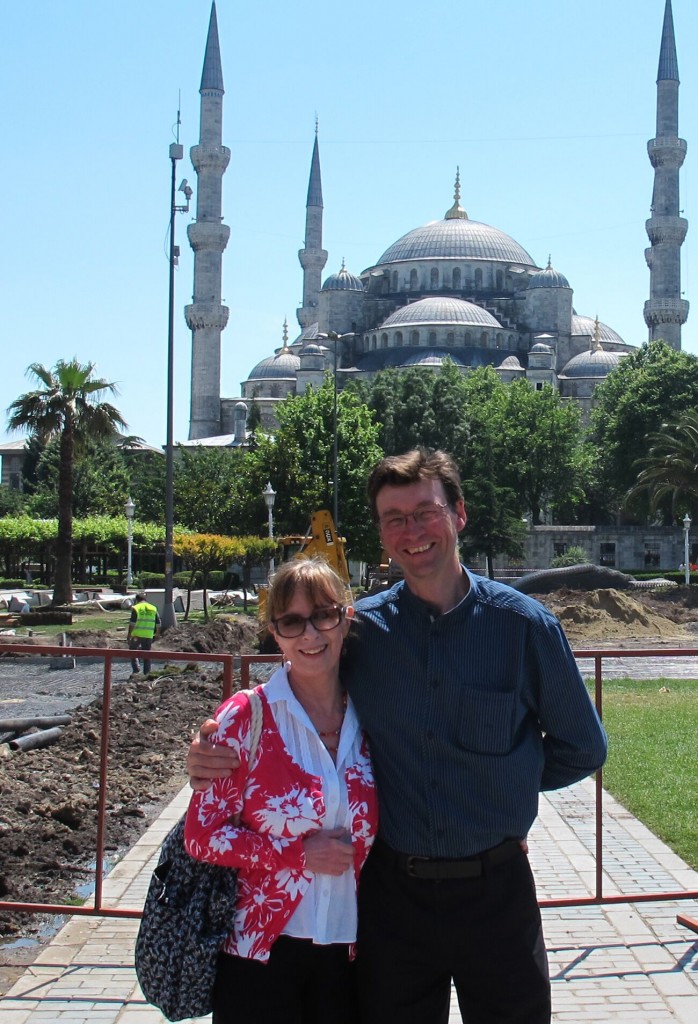
Enjoying Istanbul with Frances
Securing regular supply teaching during autumn and spring terms ensured that I could fly to Istanbul to resume my eastward journey in early summer of the following year.
Stage three: Istanbul to Erzurum
Dutch Daan and I with Turkish University Cycle Club members
The ferry journey from European Istanbul’s port on the Bosphorus to the quieter Asian shore takes an hour. During my crossing I met Daan, a Dutch cyclist supporting his own charity project, well into his ride from Amsterdam to his orphanage charity project in India. We camped, were hosted by locals along our way and were guests at a huge Turkish wedding before heading off from Ankara in separate directions.
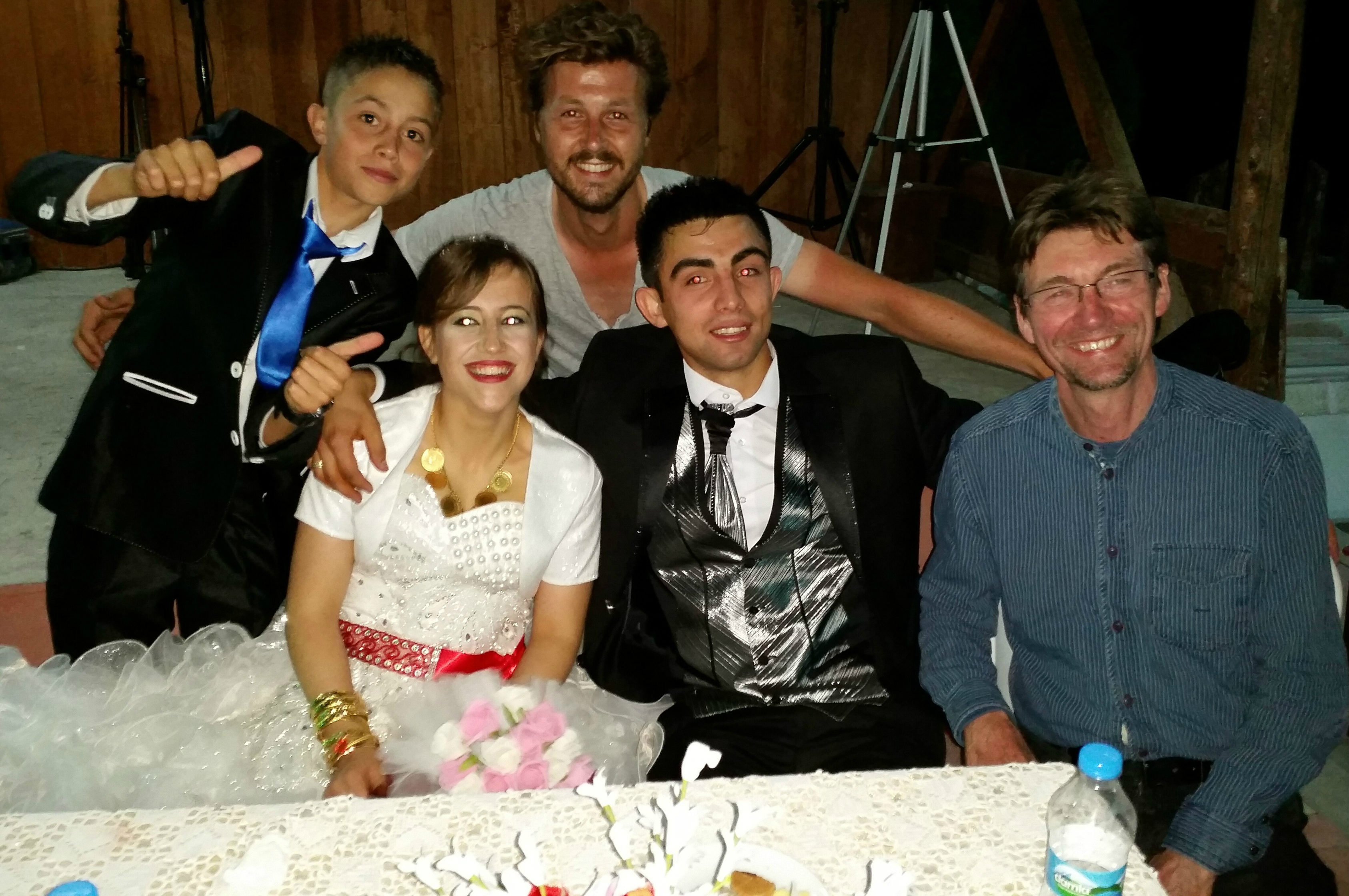
Impromptu guests at a wedding in Baypazan, Turkey
Days later in Sivas, I had my first experience of ‘couch-surfing’, when I was accommodated by Olcay and his family and friends. Olcay teaches English at a High School. He is passionate about encouraging Turkish students and teachers to appreciate the importance of speaking English. He founded an organisation which facilitates annual international ‘English Language’ conferences and has built a network of teachers. For several years, he secured Comenius project funding to develop this work.
Olcay informed me of a network of hostels built for Turkish teachers living away from home, and booked me into an ‘ögretmenevi’ in Zara, a day’s ride from Sivas. I arrived there late the following afternoon and was approached by children as I halted to find my lodging, many of whom had a level of English beyond ‘Hello, what is your name?’ Some of them were able to help me find my hostel.
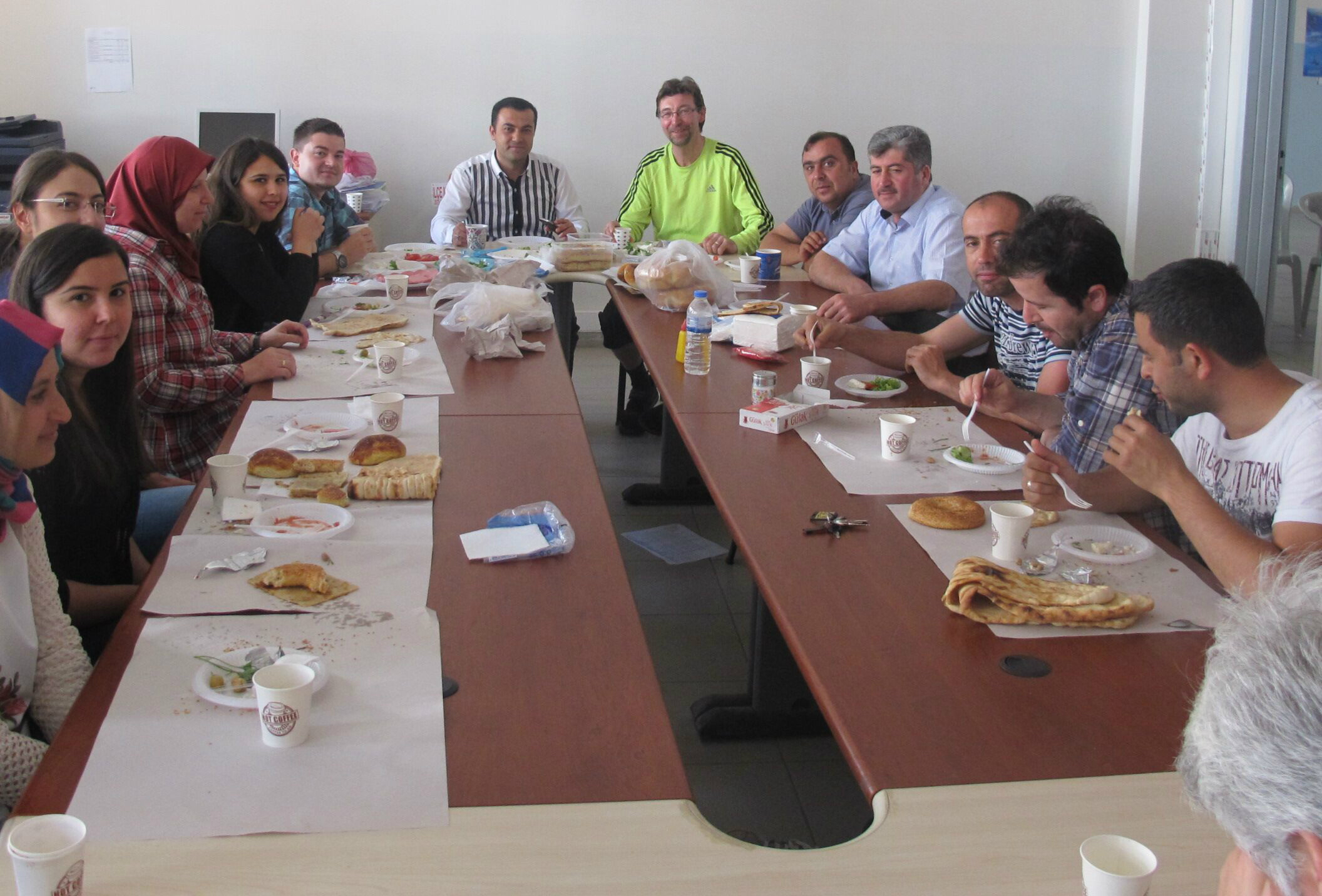
At breakfast at INSET in High School in Zara, Turkey
I enjoyed an evening with teachers from the ögretmenevi including Murat, who teaches English (He jokingly told me that he has an agreement with his classes: if any foreign tourist arrives in town the children must practice their English with them – or else face a detention!) The following day, after a school INSET I joined Murat and colleagues for brunch and had a tour of the school whilst discussing teaching in Turkey. Little on the surface appeared to be different from any large High School in the UK.
Stage four: Erzurum to Bukhara
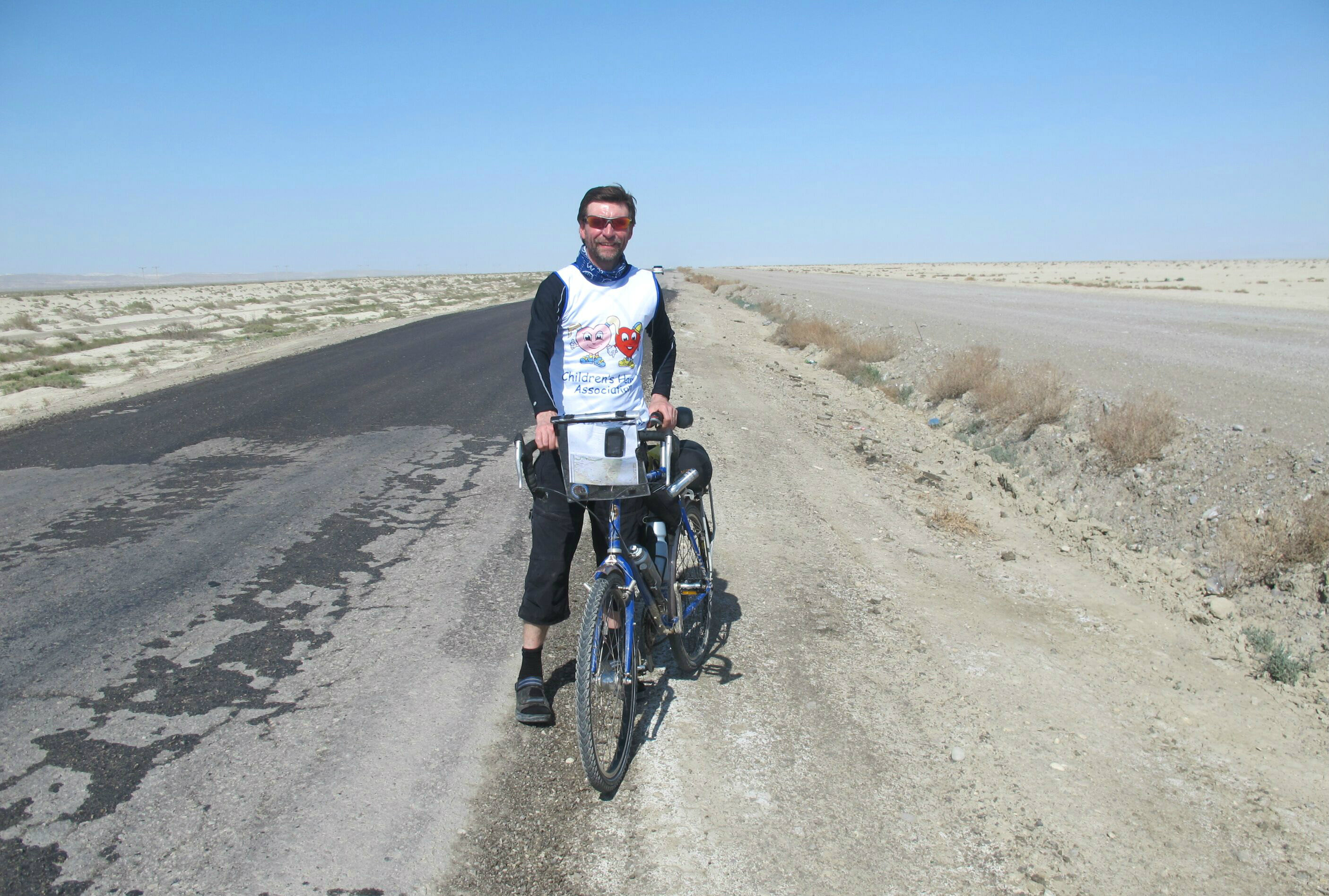
In the Karacum Desert, Turkmenistan
Returning from Erzurum, regular supply placements replenished my funds. I began my next journey, taking me through Turkey into Georgia then Azerbaijan, before crossing the Caspian Sea into Turkmenistan, where I would cross the Karakum Desert to Bukhara in Uzbekistan.
After a long first day’s ride, my evening was spent in a men’s social hall adjoining a village mosque. I watched football on TV with men who brought me plates of food and tea, and upon leaving they gave me keys to the room where I would sleep. In the morning I was ushered to follow another man who took me to his home, where a family breakfast had been prepared.
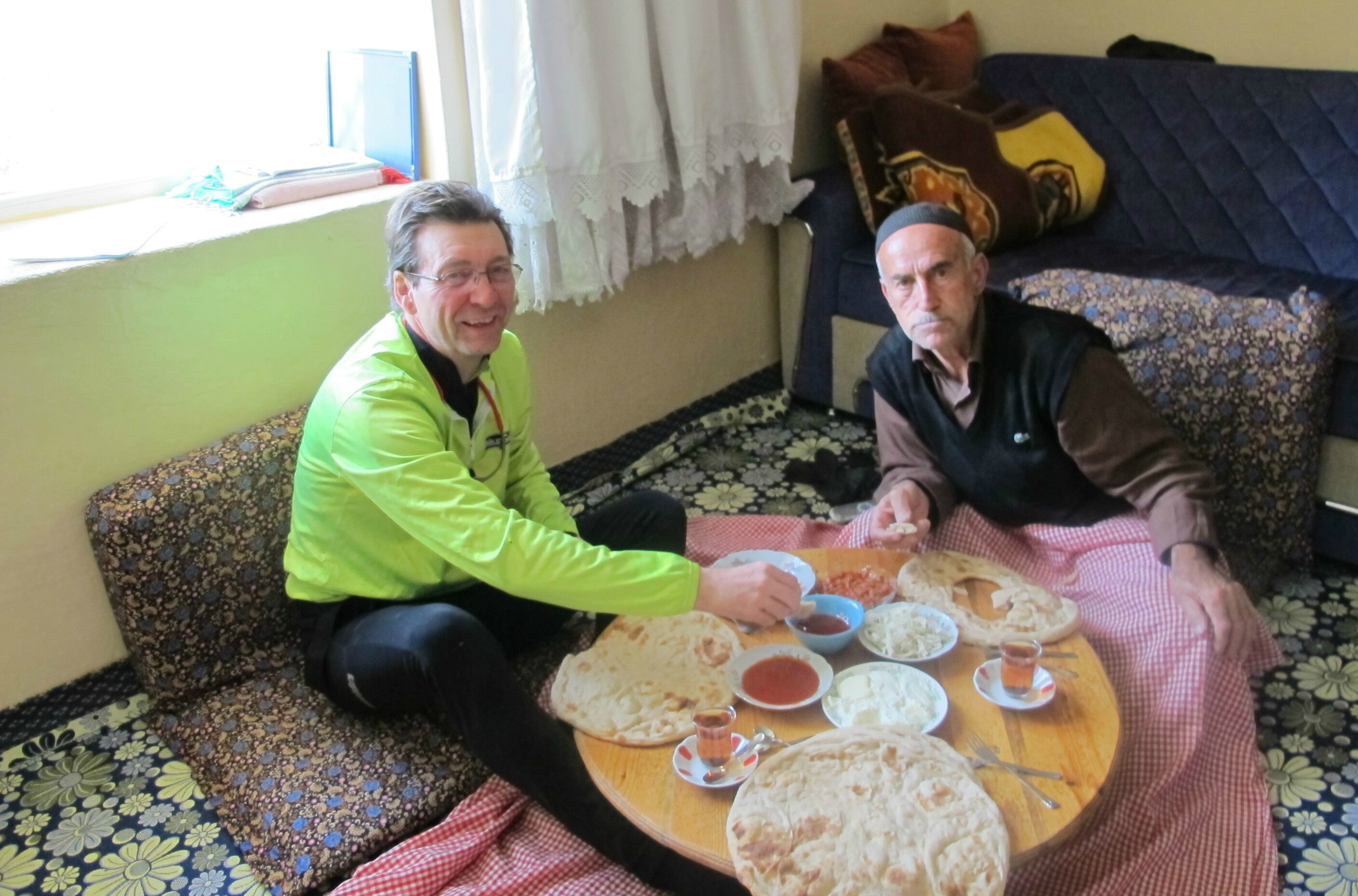
Breakfast with Ali in Balikili, Turkey
I continued riding, pursuing my route through the mountain passes, seeing ruined ancient Georgian Monasteries, stopping often to take photographs of dramatic landscapes. I cycled along the Black Sea coast from Hopa, entering Georgia and continuing to enjoy the company of hospitable, friendly people.
Azerbaijan was the first country on my ride that had a rigorous visa regime – as with many ex-USSR countries, Turkmenistan and Uzbekistan have still more stringent rules. My trip across the Caspian Sea, on a freighter, was delayed by confusion over visa requirements and when I arrived in Turkmenbashi, Tourist Visa in hand, I was met by my ‘guide’ who was to accompany me for the entirety of my trip cycling across the desert, following in a mini-bus!
A half-year placement in a primary school helped me to build funds for my most recent ride, through Uzbekistan and Kyrgyzstan. My Transit Visa, which would have allowed me to continue my ride from Ashgabad, arrived late, so I changed plans and booked a flight to the city of Bukhara.
Stage five: Bukhara to Irkeshtam
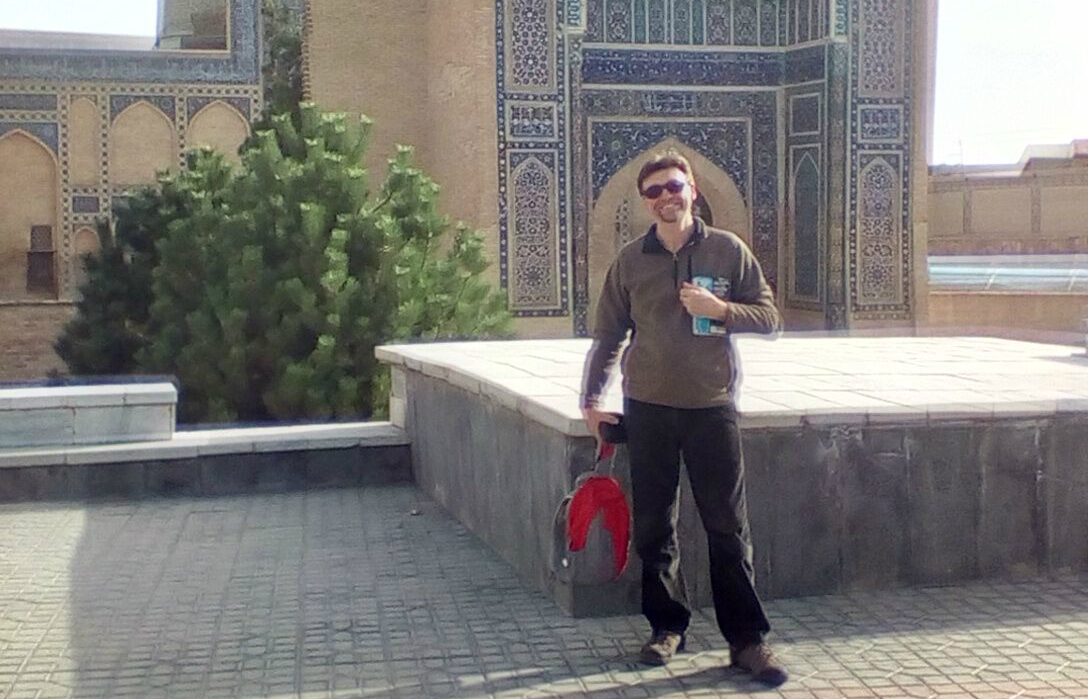
Bibi-Khanim mosque – Samarkand
After an unexpected day in Tashkent, my Uzbekistan experiences continued to be very varied. Bukhara and Samarkand are two Silk Road cities with romantic names, evoking images of Islamic grandeur and also the terrible eras of Genghis Khan and Tamerlane. I’d planned a day’s sightseeing in both. On the road I met with two long-distance cycling French brothers, and I made plans to cycle with Jean towards my destination of the Chinese border crossing at Irkeshtam. We cycled together for two days before stomach problems delayed him in Samarkand, and consequently I carried on alone again.
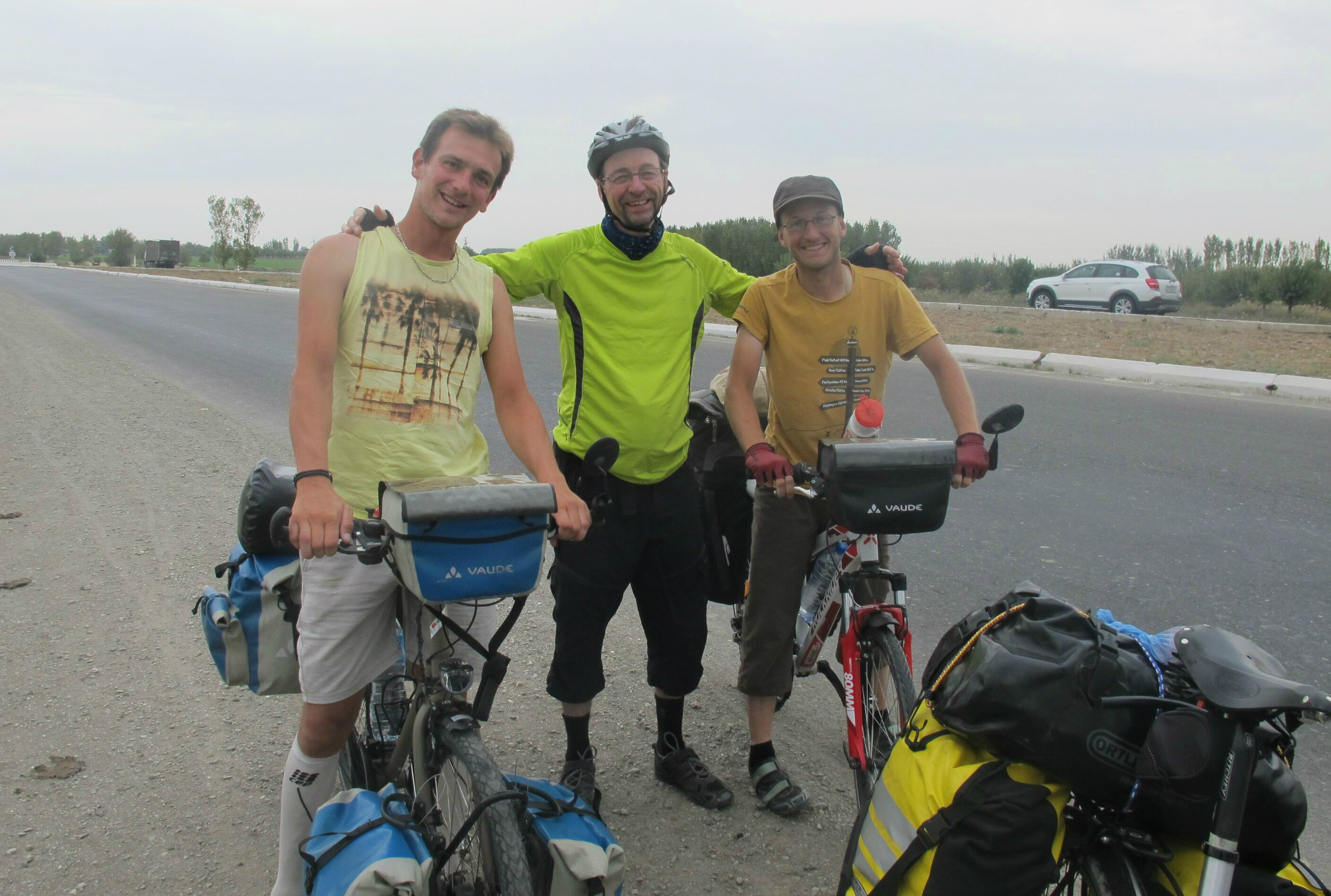
Cycling to Samarkand with French brothers I met on the road
On two successive evenings I cycled around small towns, stopping to ask where a hotel or guesthouse was – neither town could provide one. On the first evening I ate in a restaurant and then was allowed to sleep under a terrace outside. On the second evening I found a small café with a large garden in front, which looked promising, and as night fell the owner helped me to pitch my tent. I ate with two brothers using my photo book – an album of pictures of me and where I’m from, annotated with phrases in local languages – to generate some communication. They insisted that I did not pay. My day, apparently, was finishing well…
A small group entered as I was preparing to leave. They wanted vodka. One, who had his young son with him, noticed me and offered vodka – it will help me sleep, I thought. Through his son, who had listened well in his English lessons, the man suggested that I stay with his family rather than in my tent. I smiled, and told the boy to tell his dad that I was fine, my tent was already prepared. The man was insistent and became offended when I had refused his hospitality.
The group moved on and I got into my sleeping bag. The garden was quiet, several yards away from the dark road. I prepared to sleep. Some moments later my tent was shaken quite violently and loud voices outside called to me in Kyrgyz, then Russian. Emerging from my tent, in the darkness I saw two uniformed policemen staring down at me. The café owners were summoned and it was clear that I would not be able to sleep here. From somewhere, an English speaker appeared, who told me that I would have to repack my tent and that he would be taking me and all my belongings to the nearest town with a hotel.
I was driven away. Once out of sight of the police, he asked if I would prefer to stay the night at his family house. We drove the short distance, using a circuitous route to avoid the police.
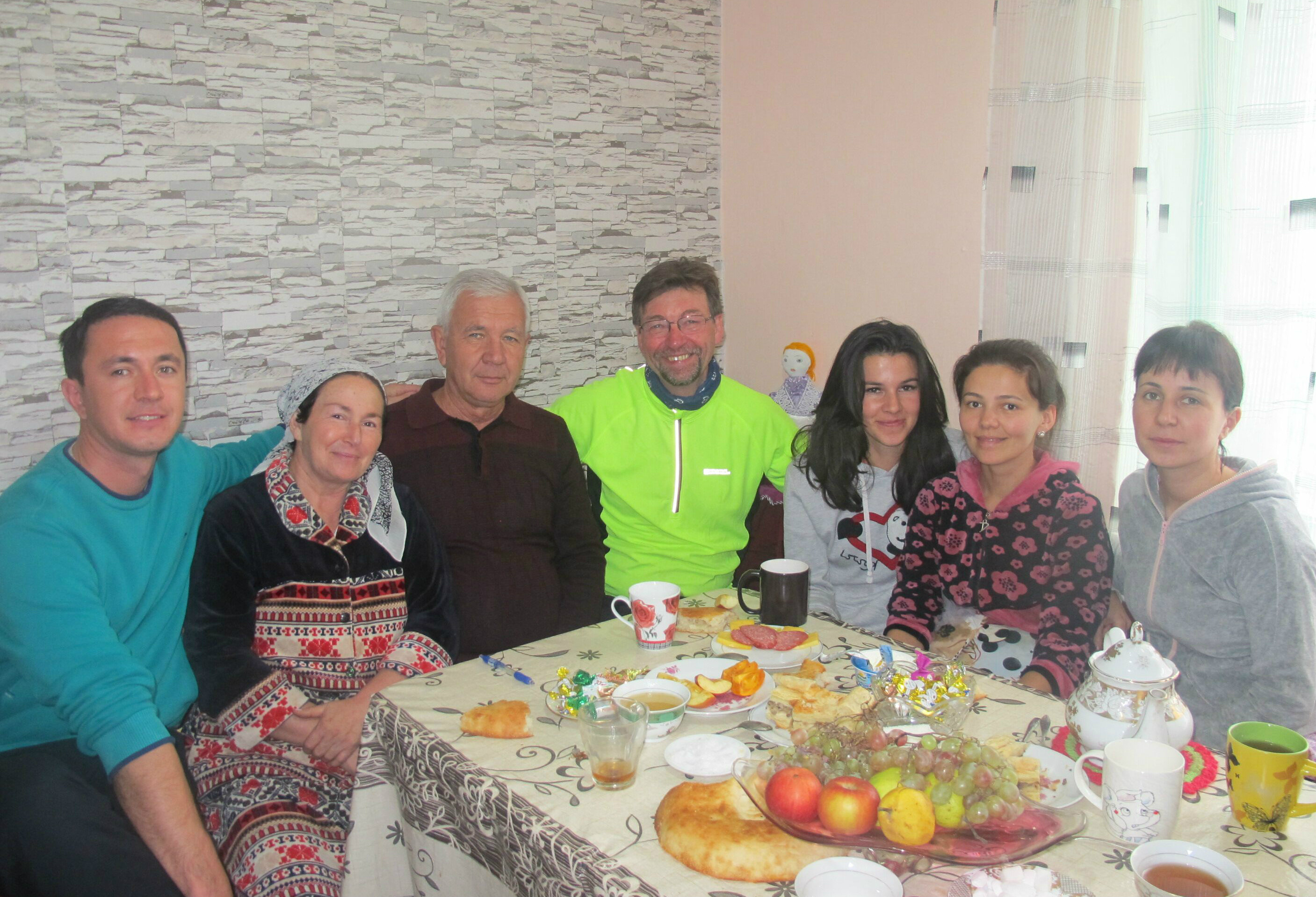
Breakfast hospitality in Jizzakh, Uzbekistan
The house was large, and had all of the furnishings of a comfortable English home. His younger brother had been married earlier that week and the family were all staying. The mother, a doctor, and the retired father had only Russian, while the younger members all spoke excellent English. I was hosted as a special visitor through the early hours. It was afternoon on the following day, after a huge breakfast and visits to others in the family, before I could continue my ride.
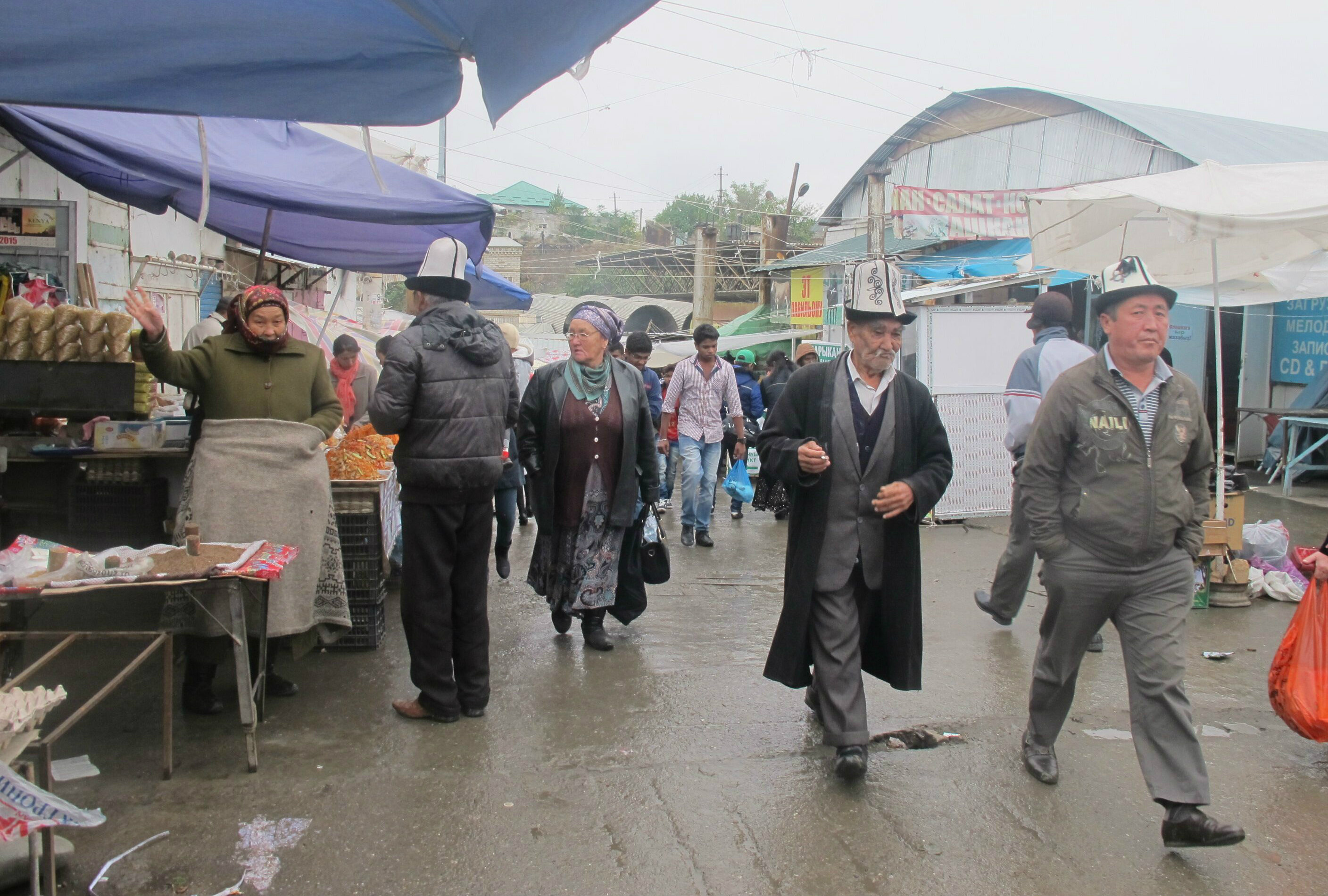
Osh Market – the largest in Central Asia
I was tired and a little anxious as I cycled through the heavy Tashkent rush hour traffic, an hour after darkness had fallen. I was not sure where I’d find somewhere to sleep that night and was certainly unaware that I was about to start the strangest episode of this ride.
A group of men were emerging from a small workplace, so I stopped and wheeled my bike towards them, indicating that I needed somewhere to stay. One of them bid me follow and he took me back to the busy road. It is the custom in some countries for people to flag cars down, agree routes and a price, using private cars as taxis. The stranger flagged a large saloon-car down and asked the driver to take me and my loaded-up bike to a local hotel. My acquaintance of five minutes then adamantly insisted on paying. I loaded up and Shah, my driver, drove into the traffic – my precious bike bouncing, restrained only by my bungee cords half-hanging from the boot.
We arrived at a pleasant looking hotel – I resolved that after three cheap nights, I could afford a night here. While Shah unloaded his car, I was handed my room keys and started the formalities, completing registration forms while my passport and previous Uzbek hotel receipt slips were photocopied. Then, unsmilingly, the receptionist told me, ‘sorry, you can’t stay here.’ The reason, he explained, was that I had not stayed in a registered hotel for three days. ‘No hotel in Tashkent will allow you to stay’ he added.
Shah was as confused as I was. We loaded his car again and as he drove me through the busy traffic, he told me that his wife had given birth to their first child two days previously – but I was not to worry as she was staying with her sister. Three more hotels, three more ‘no’s’. The receptionist there helpfully informed me that the laws of his country were such that – having transgressed the ‘Tourist Visa holders must not have a three day gap from staying in registered hotels’ law – I was likely to be fined as much as $1200 on exit from the country. Shah then unsuccessfully tried to resolve matters at two separate police stations. Eventually in the early hours of the morning, after negotiating a reasonable price, we loaded my bike into a taxi to take me four hundred kilometres to the Kyrgyz border.
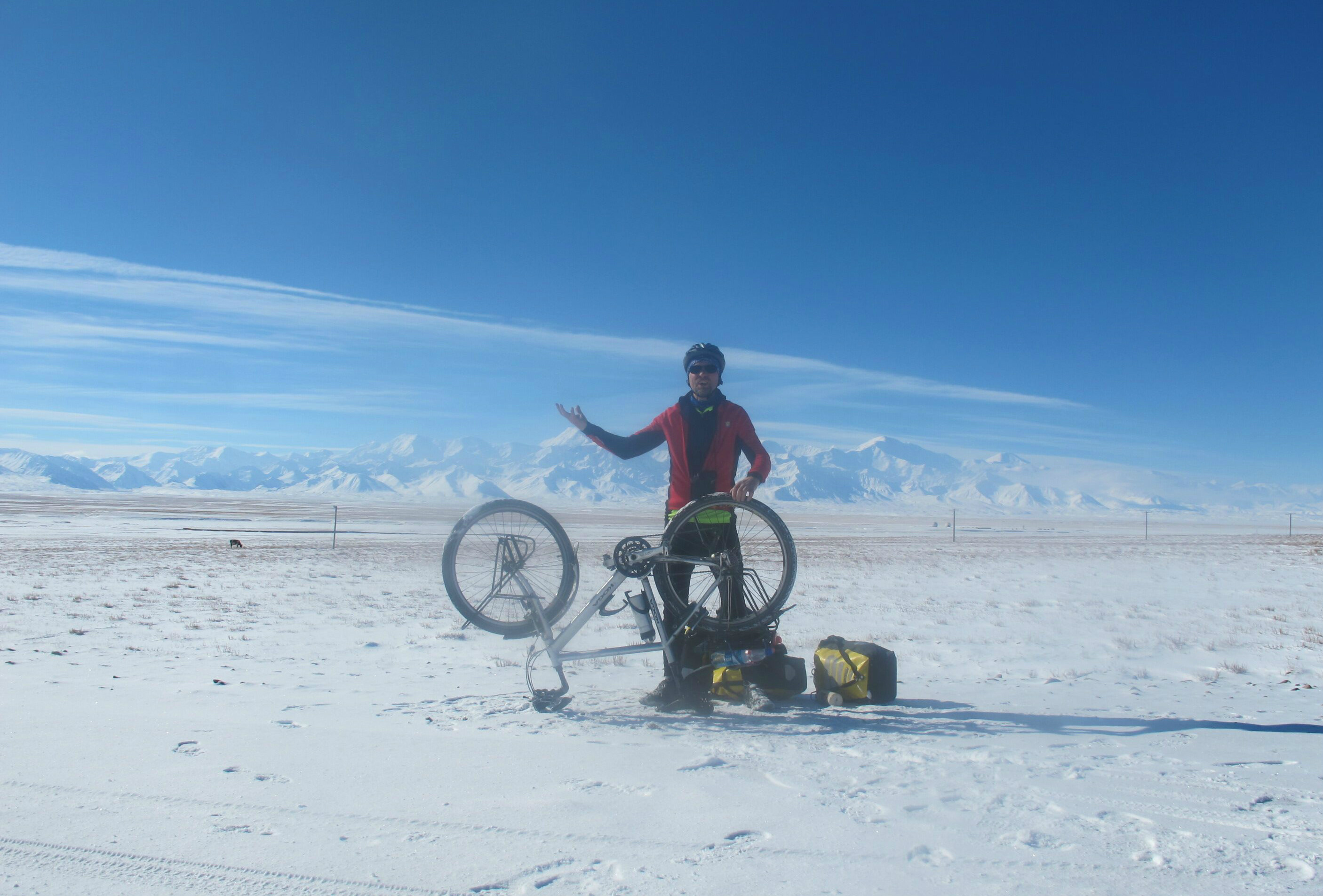
Getting a puncture in the snowy Pamirs, Kyrgyzstan
At the border, at ten in the morning Murat, my driver, helped me to reassemble and load my bike to approach the border crossing. I smiled nervously as every item in my badly packed panniers was scrutinised, my passport and paperwork was checked, and… ah, luckily no fine!
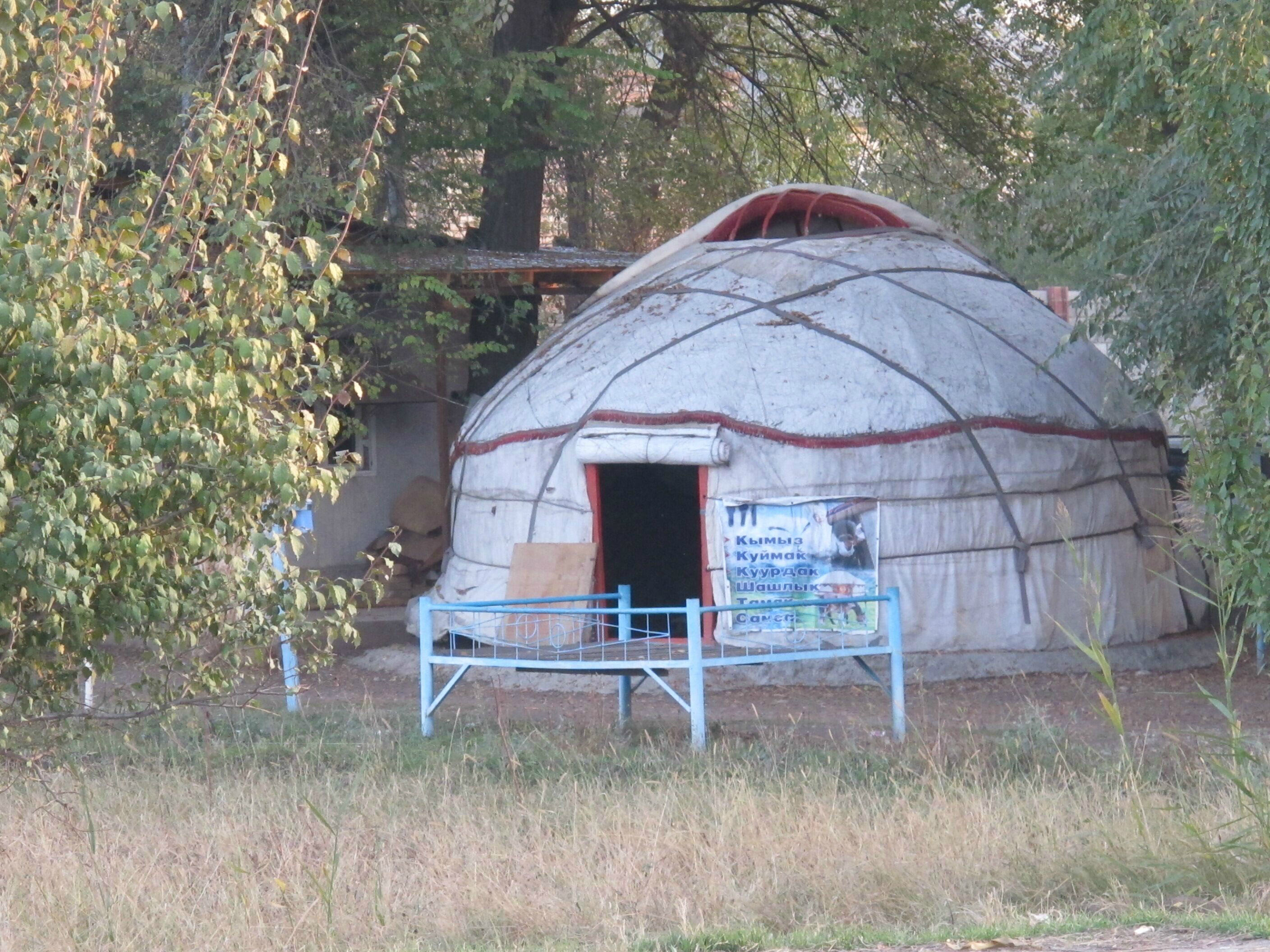
A yurt in Kyrgyzstan
The trip ended with two weeks travelling through fascinating Kyrgyzstan, meeting other cyclists – all much younger than myself and mostly on long routes, away from their home-countries for a year or more. After starting out from Bukhara where the temperatures were approaching 100F I spent a day high in the Pamir Mountains, in a home-stay in Sary-Tash, snowed in and celebrating another English cyclist’s 27th birthday. My final stretch of cycling, with Tomas, a young Frenchman, started badly with a puncture, followed by lots of slipping and sliding on treacherously frozen roads ten thousand feet above sea level. After we had both fallen from our bikes several times we decided to seek refuge at the only house between two small towns. Fortunately we were offered accommodation there, and the following morning we cycled to the border. Tomas headed east towards China and Kashgar, where – with more supply teaching to support me – I will start the next stage of my journey next year.

Arriving at Manchester Airport with boxed bike
Combining work and travel
At the time of my initial professional training there was a belief that a refreshing Sabbatical Year would become a normal and regular part of a teacher’s ongoing development. However, this doesn’t seem to have transpired. For most teachers, the possibility of taking ‘time out’ becomes much more difficult once responsibilities start to mount, and ‘gap-periods’ are afforded only during the summer break.
Since ‘retiring’ I have had more experience of working in different schools, many of them good or outstanding, than at any time during my full-time career. Additionally, I’ve now travelled more widely and have gained insights into the cultures, religions, education systems, art, music, viewpoints, politics and life expectations of various countries. Many of my experiences have a direct and enriching effect on curriculum areas that I use during my supply teaching. I am convinced that many teachers in mid-career would benefit from a career break affording similar experiences – perhaps flexible working using teaching supply agencies could be the means by which such teachers could achieve their ambitions.
For anyone wishing to support my efforts, donations to the two charities can be made on my sponsorship site.
